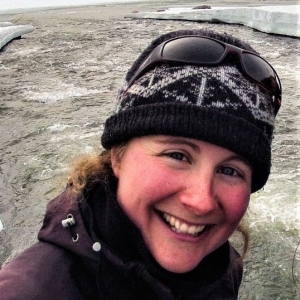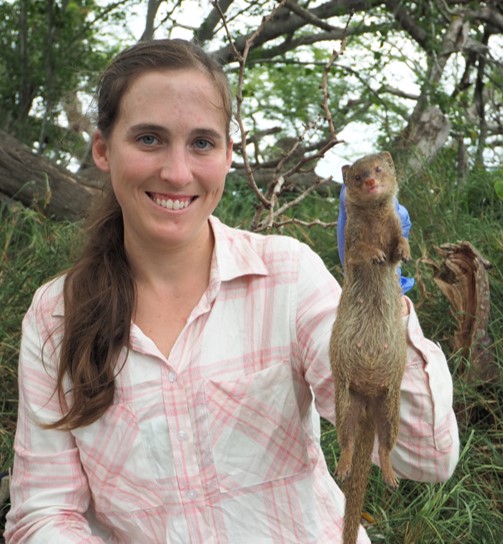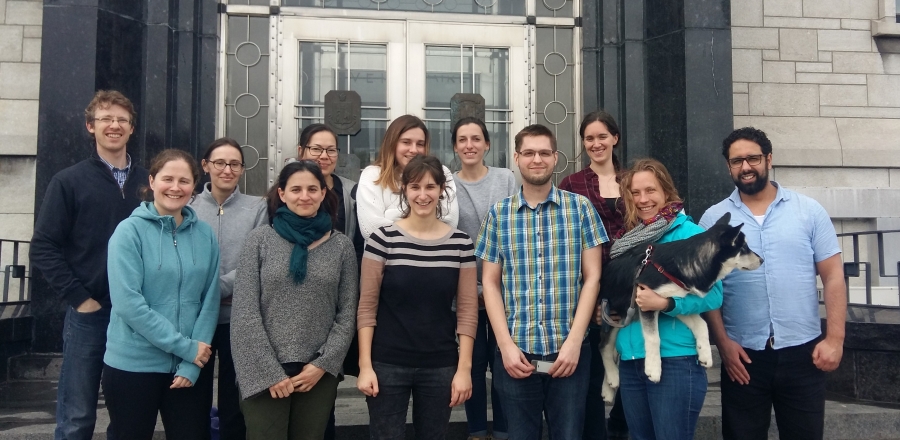
Principal Investigator
Patrick Leighton is Professor of Epidemiology and Public Health at the Faculty of Veterinary Medicine, University of Montreal, and an active member of the Epidemiology of Zoonoses and Public Health Research Group (GREZOSP) and the Centre for Public Health Research (CReSP). His research focuses on the ecology of wildlife diseases that are transmissible to humans, and in particular the impact of ecological change on the epidemiology of these diseases and the risk they pose to public health. He is director of the Canadian Lyme Disease Research Network (CLyDRN) and co-directs U. Montreal’s Master’s Programs in One Health and Veterinary Public Health.
Contact: patrick.a.leighton@umontreal.ca

Postdoctoral Researcher
Using rabies to explore how the complexity of a wildlife disease system affects its response to ecological disturbance
Emily completed her PhD at the University of British Columbia in 2020 where she studied the potential ecological drivers behind the 1999 outbreak of Cryptococcus gattii s.l. on Vancouver Island. Her previous work includes mapping malarial mosquitoes in Tanzania to determine whether mosquito net rollouts have targeted mosquito hotspots. Her postdoctoral research will use rabies as a case study to explore disease system complexity and how this complexity may affect the disease system’s response to ecological changes.
Contact: emily.acheson@umontreal.ca

Postdoctoral Researcher
Environmental changes and vector-host-pathogen interactions: applications of modelling approaches to explore the ecological mechanisms underlying the range expansions of vector-borne diseases and rabies in North America
Olivia completed her PhD at Université Laval in 2016 where she studied functional relationships between the heterogeneity of agriculturally fragmented landscapes and space-use patterns of raccoons and striped skunks, two main hosts of the raccoon rabies virus variant. Her postdoctoral research focuses on spatio-temporal modelling and mapping of zoonotic disease risk in the context of environmental changes with emphasis on vector-borne diseases (especially Lyme disease), and rabies in raccoons, striped skunks, red foxes and Arctic foxes in North America. Olivia is currently working on the development of an agent-based model to explore how the interplay between the animal dispersal behaviour and landscape characteristics influences the rate of vector-borne disease spread.
Contact: olivia.tardy@umontreal.ca Publications
François Viard, Postdoctoral Researcher
Contact: francois.viard@umontreal.ca

PhD Student
Modelling the future dynamics of Arctic fox rabies
Arctic fox rabies poses a significant threat to public health in the Canadian Arctic. Rabies can spread quickly due to long-distance movements of foxes over tundra and sea ice. Climate change is likely to impact the public health risk of rabies in the north by altering the range and quality of fox habitat, as well as fox movement behaviour and interactions. Agathe’s PhD explores the impact of climate warming on future rabies dynamics with applications to rabies risk management in the Canadian Arctic. You can find a short video illustrating her project here.
Contact: agathe.allibert@umontreal.ca Publications

PhD Student
Detection, prevalence and transmission mechanisms of Toxoplasma gondii in foxes and lynx of Northern Canada
In changing northern ecosystems, understanding the mechanisms of zoonotic pathogen transmission is essential to protect vulnerable animal and human populations that live in these regions. As sentinel species, foxes and lynx give us a better idea of Toxoplasma gondiidistribution and help us understand how it persists in this ecosystem. Émilie’s PhD focuses on the detection of the food-borne parasite T. gondii in foxes and lynx of northern Canada, with a modelling component linking foxes and trophic relationships.
Contact: emilie.bouchard.5@umontreal.ca Publications ResearchGate

PhD Student
Spatial eco-epidemiology of the blacklegged tick and its pathogens in a nature park in southern Quebec
Ariane completed a multidisciplinary BSc in Environmental Sciences and GIS at UQÀM. Her PhD project focuses on the dynamics of Lyme disease emergence in southern Québec, aiming to identify ecological factors and processes that are critical for the establishment of both the ticks and the pathogen that causes Lyme disease.
Contact: ariane.dumas@umontreal.ca

PhD Student
Sentinel surveillance for vector-borne disease: tracking the emergence of Lyme disease in Canada
Lyme disease (LD) is a vector-borne zoonotic disease caused by the spirochete Borrelia carried by the black-legged tick (Ixodes scapularis) with increasing incidence in Southern Canada. In 2010, 143 cases were reported in the country, rising to over 2000 by 2018. Camille’s research explores the acarologic and human risk factors which could explain this rise in LD incidence, using data from sentinel surveillance sites and reported human cases.
Contact: camille.guillot@umontreal.ca

PhD Student
Ecological control of the transmission cycle of Borrelia burgdorferi through administration of acaricidal treatment to Peromyscus mice
Lyme disease, caused by the bacteria Borrelia burgdorferi, and its vector, the black-legged tick Ixodes scapularis, is currently emerging in southern Quebec. One approach to reduce the risk of Lyme disease is to treat the rodent reservoirs of the disease in nature to control ticks and thus interrupt local endemic cycle of the disease. Jérôme’s PhD project focuses on evaluating a new approach for treating wild rodents with potential applications for the control of tick populations in periurban environments. See our 2020 paper in Parasites & Vectors showcasing the first results of this project.
Contact: jerome.pelletier.1@umontreal.ca ResearchGate

PhD Student
Impact of environmental changes in Québec and Ontario on the risk of exposure to mosquito-borne zoonotic diseases
Risks associated to mosquito-borne diseases (MBD) are linked to several factors such as global warming, global changes in the environment as a result of human activities, and increased global trade, increasing the risk of introducing exotic diseases. Much work has been done to date on modeling the impacts of climate change on mosquito habitats in North America but, to our knowledge, none has been interested in the joint impacts of climatic factors and other factors, such as anthropogenic changes. Rindra’s PhD focuses on the combined effects of climate change and land use on the risk exposure to MBD in Quebec and Ontario.
Contact: mr.rakotoarinia.randriamialy@umontreal.ca
Video: Ma recherche en 180 secondes

PhD Student
Rabies in small Indian mongooses in the Caribbean: influence of spatial ecology, social behaviour and landscape features on disease dynamics, and implications for control and management
Caroline completed a M.Sc. in biology at Université Laval in 2014 where she studied marine mammal ecology and behaviour, and a DVM at Université de Montréal in 2020. She is carrying out a PhD project quantifying mongoose density, movement and response to disturbance, while modelling the influences of mongoose ecology and landscape structure on rabies dynamics in the Caribbean. The results of the model are expected to help identify optimal long-term control strategies for terrestrial sylvatic rabies on islands were mongoose rabies is endemic.
Contact: caroline.sauve.6@umontreal.ca Publications ResearchGate

PhD Student
Arctic Arboviruses: diversity and infectious status of arthropod vectors
Carol-Anne completed a B.Sc. in Microbiology and Immunology at University of Montreal in 2017. For her MSc project, she established an arbovirus surveillance program in sentinel communities across the Canadian Arctic and Alaska to detect the presence of California serogroup (CSG) viruses in hematophagous insects. She has now expanded her project to a PhD aiming to establish the role of different vectors in the transmission cycle of CSG viruses in the Arctic by measuring the abundance of different Arctic arthropods, their blood meal sources, infection rates and their vector competence. You can find a short comic illustrating her project here.
Contact: carol-anne.villeneuve@umontreal.ca Publications
Podcast: Science infuse

MSc Student
Determining the effects of the winter tick (Dermacentor albipictus) on moose health: an experimental approach
The winter tick, like many arthropod species in North America, is likely to see its range increased by climate change and human activities. Delphine’s research focuses on manipulating the parasite burden of winter ticks on moose calves in the field to determine the effect of tick load on different aspects of moose health.
Contact: delphine.de-pierre.1@ulaval.ca

MSc Student
Spatial distribution and gastrointestinal parasitism of dogs in communities of Nunavik
Hélène is completing a joint DVM-MSc program at Université de Montréal. Her MSc project focuses dogs in Nunavik communities, both their spatial distribution within the community and the prevalence of gastro-intestinal parasitism, with the aim of assessing risk factors for parasitism in dogs and transmission of zoonotic parasites to people.
Contact: helene.dery@umontreal.ca

MSc Student
Use of sarolaner to treat wild rodents: an innovative approach in the fight against Lyme disease
Gabrielle’s research focuses on evaluating the efficacy of sarolaner, an oral acaricide of the isoxazoline family, in breaking the transmission cycle of Lyme disease in wild rodents in the Thousand Islands Archipelago, a region known to have a large population of ticks and a high prevalence of Borrelia burgdoferi, the bacteria that causes the disease.
Contact : gabrielle.dimitri.masson@umontreal.ca

MSc Student
Spatial and temporal variation in contact and risk of rabies transmission among foxes in the Arctic
Contact: marie-christine.frenette@umontreal.ca
ALLUMNI

Valerie Hongoh, Postdoctoral Researcher (2018-2020)
Evaluating the risk of raccoon rabies virus re-incursion into Quebec
Contact: Valerie.hongoh @umontreal.ca

Yi Moua, Postdoctoral Researcher (2018-2019)
Modelling multi-species rabies dynamics in the Arctic
Contact: Yi.moua@umontreal.ca

Audrey Simon, Postdoc (2012-2018), Research Associate (2018-2019)
Wildlife diseases important for human health and food safety in the changing environment of the Eastern Subarctic
Contact: audrey.simon@umontreal.ca
